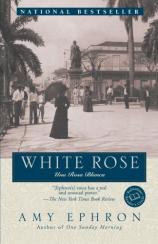Excerpt
Excerpt
White Rose

Case de Recojidas The Prison for Abandoned Women Havana, Cuba September, 1897
She was seated at a table in the center of the prision yard, in a straight-backed chair, the legs of which were slightly uneven and wobbled uncertainly against the coarse and rocky soil. The table was roughly carved so that if she was not carful where she placed her hands, she would come away with splinters.
She sat perfectly erect, barely moving, holding her head high, chin slightly down, breathing, in small measured breaths because the acrid smell of female urine, intensified by the sun which beat down relentlessly in the open patio of the Recojidas, was not one you could ever get acustomed to.
She longed for the slight shelter of a palm tree, to walk barefoot in the sand, to let her feet be cooled by the crystal blue water as the soft waves crashed lightly into shore. She wanted to breathe the moist tropical air, lightly scented with flowers, the air of her childhood, that she knew still existed a few blocks away.
She was dressed in a high-necked, concealing, long-sleeved dress that did little, however, to hide her lithe form, incongruously, as if it were a few years ago, and she was on her way to tea at the big house on the plantation. They had brought her the dress that morning, freshly ironed, so that she would appear to the public to be better treated than she was. The dress still smelled faintly of the carnation water she used to sprinkle on so liberally. She wondered what they had done with the rest of her things--if one of the guards' wives wore her black lace shawl at night and someone else was reading her Bible and playing with the beads of her rosary.
She had dressed carefully and pinned her hair up, squeezing her cheeks to try to put some color in them. It suited her to go along with them, to present an image of respectability.
It pleased her that they were a little afraid of her and afforded her certain liberties that they did not allow the other prisoners--that they would still let her have some discourse with the outside world.
There was a composure about her, a peacefulness, way beyond her years and certainly curious in her present circumstances. She was still young enough not to be frightened of anything, despite what she had been through.
She was staring straight ahead, her eyes intently fastened on the entrance gate. She wanted to see him when he first came in, this journalist who was coming to see her, who had been sent by Mr. Hearst to interview her.
She was aware of everything around her--she had been trained to this, long before she was imprisoned. The cluster of black women in the corner passing a lone cigarette between them, their torn dresses draped about them with little attempt to conceal their bodies, as they stood hunched defiantly against the thick waalls that towered high in the air, well within the sights of the lone guard, posted atop the parapet, armed with a Spanish rifle. They had seemed to her, at first, so fierce, these black women, as though they, too, were an enemby faction, something else to be feared. But that was before they had earned each other's respect. Anna, the oldest of the prisoners, standing off to the side alone, nervously shifting her weight from one foot to the other, as if she were a child, her gray hair hanging scraggly about her face, her pale blue eyes almost as translucent as her skin. For murdering her husband, she had been sentenced to life, a life that would no doubt be cut short by her sentence. It was said that in the moment when she took his life, she lost her will to communicate with the outside world. It was Anna that Evangeliana understood the most, how violence was the only way that she could think to silence him, how when she neatly slit her husband's throat with a hunting knife, as if in penance, commited herself to a world of silence. The other women, seemingly educated gently women, who stood apart by their background, there for the same reason that Evangelina was--because they or their father or their cousin or their husband or their neighboor believed in their country, their right to a free country, more than in anything else. It was that belief, that naive conviction, that gave her what little composure she had.
Would she tell her story again? Yes. She would tell it as many times as she had to. Viva Cuba Libre.
Courtesy of Random House, Inc.
Excerpted from White Rose © Copyright 2012 by Amy Ephron. Reprinted with permission by Ballantine. All rights reserved.
White Rose
- paperback: 288 pages
- Publisher: Ballantine Books
- ISBN-10: 0345441109
- ISBN-13: 9780345441102



